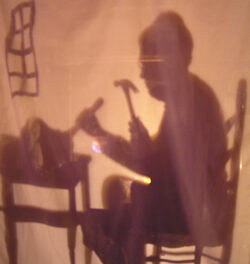No reviewer should ever admit to preconceived notions about the concert he’s been assigned, but to be honest I wasn’t looking forward to hearing the Ernest M. Skinner organ at First Presbyterian Church in Wilmington. Ernest Skinner was highly innovative and influential at a time I consider a low point of American organ building. Of course, some of the best examples of his work need be saved and loved by those who can, but I’d rather not be in that number. I had that dark cloud over me when I entered the church. I became even gloomier when I saw that the organist was 18 years old. I have heard some splendid playing from 21 and 22 year olds, however, so I maintained an open, if gloomy, mind.
I am delighted to report that my contrariness was misplaced. As Skinners go, The James Sprunt Organ in Wilmington is one of the finest and is in superb condition, and Bryan Anderson is simply first class! The organ is in its original hall, which is in original condition, with hard surfaces and crisp acoustic; the organ was completely re-built to its original specifications in 2011. As befits a rich man’s gift in the late 1920s, the organ has (forgive me!) all possible bells and whistles, including a celesta stop, chimes, and a truly distinctive Vox Humana. (Stop list here)
The audience was about 200, an amazing number for an organ recital on Memorial Day weekend. The attire ranged from discrete beach wear through old hippy and Old Navy to restrained corduroy suits and a patriotic dandy in navy blazer, blue shirt, red bow tie . . . and bright red khakis and bright red sneakers!
This program was the final concert for the year in the fifteenth year of Music at First. Congratulations and many happy returns.
Anderson began with Bach, the D Major Prelude and Fugue, S. 532, simply first class. Every entry had the freshness of a wave that breaks on the beach and comes running up and covers your feet. Every phrase had a musical destination and got there. Anderson’s playing is so good that he need not have troubled himself with so much changing of registration.
The Divertimento from Percy Whitlock’s Four Extemporizations, featured, under Anderson’s fingers, a clear sense of direction. Whitlock’s allegretto from Four Short Pieces began with flutes like mice on the keys, and then added a long singing alla breve type string solo.
The Suite profane of Jean Réne Désire Françaix, though competently played, had everyone nodding off until the fourth movement, when the opening chord blasted everyone awake in the style of Haydn. If anyone had been still asleep, the finale unleashed the screaming mimis from deep in the organ chamber!
After a brief intermission, Anderson played four of Bach’s Leipzig chorales, S. 567, “Nun Danket;” S. 654, “Schmücke dich;” S. 660, “Herr Jesu Christ, dich zu uns wend;” and S. 668a, “Vor deinen Thron tret’ ich heirmit.” The tempo of “Nun Danket” was just right, neither slow nor rushed. The Skinner sound, relatively devoid of interesting high harmonics, but powerful sound from lots of higher than baroque wind pressure, filled the room.
“Schmücke dich” was played tranquilly, with lovely articulation. The trio sonata “Herr Jesu Christ” had a merry-go-round sound that cascaded over the six-note theme fragment in the pedals. Anderson’s playing was much clearer than the organ. When the full theme finally entered in the pedals, Anderson’s articulation was very careful without seeming self-conscious. The beginning of “Vor deinen Thron” was so soft on string stops that it could hardly be heard; some of the audience indeed could not hear it, as they continued to talk until the theme entered on a Skinner magic flute. They realized then that the music was playing and abruptly stopped talking. This was perhaps Anderson’s best playing, but was not appreciated by the whisperers.
Karg-Elert’s “Harmonies du Soir” was lush and corny, but Anderson made it sound almost elegant.
Anderson did his best to lend some unity to Leo Sowerby’s “Jubilee,” but the compositional ideas are all over the map. Nevertheless, Sowerby was a perfect pairing with the “American cathedral sound” of Skinner, or so I thought until after a standing ovation, Anderson played an encore.
Excellently played, and sounding exactly as the composer had specified, was Charles Courboin’s Belgian Mother’s Song, on Celesta, strings, and Vox Humana. Courboin was an early performer on the Wanamaker Grand Organ, and Anderson, a student at the Curtis Institute, is currently the assistant organist of the Wanamaker Organ.











